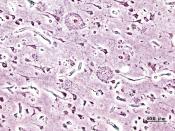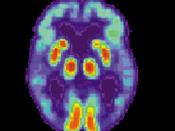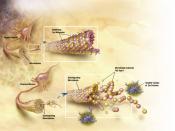Alzheimer's disease (AD) is a progressive neurodegenerative disease characterized by abnormal clumps (amyloid plaques) and tangled bundles of fibres (neurofibrillary tangles) composed of misplaced proteins in the brain. It is by far the most common cause of dementia (Please see Fig. 1). First described and named after the German neurologist Alois Alzheimer, it can occur sporadically, or in a genetic form called Familial Alzheimer's disease (FAD). Victims of AD are frequently unaware that they have the disease and initial suspicions are often raised by relatives or friends who may identify one or more symptoms. It is an insidious disease that is usually fatal within 10 years of onset and the first symptom will usually be the loss of short-term memory, followed by difficulties in time and spatial perception, communication, reading and writing. Midway through the progression of AD as the brain has started to shrink, patients will lose the ability to recognize friends and family and also their own reflection in a mirror.
In the final stage of the disease, all intellectual function will break down; the ability to chew and swallow will be lost, as will the control of bowel and bladder functions. The patient will need constant care, respiratory problems will worsen, and eventually they will die, most likely from infection.
Fig. 1 - Causes of Dementia in the UK
Parkinson's disease (PD) is a chronic, progressive neurodegenerative disorder that affects the nervous system. Idiopathic PD is the most common form of Parkinsonism (a group of movement disorders that have similar features and symptoms) and the cause of the disorder is largely unknown as opposed to other forms of Parkinsonism. Dr. James Parkinson discovered the disease in 1817 and identified it as shaky palsy. It was not until 1960 that changes in the brains of Parkinson's patients were...


